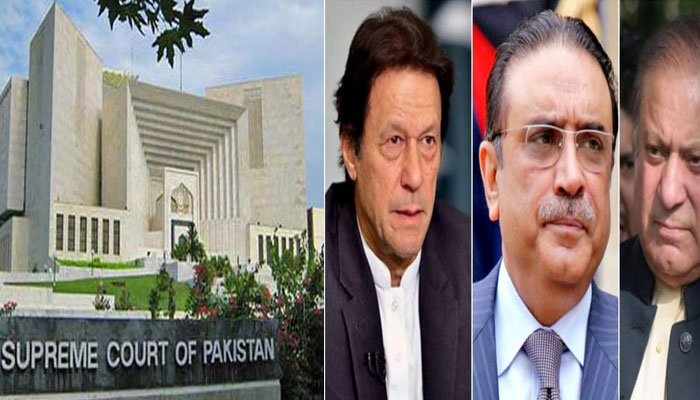Supreme Court forms larger bench to hear presidential reference
ISLAMABAD: The Supreme Court of Pakistan has constituted a larger bench to hear a presidential reference as well as a petition of the Supreme Court Bar Association for restraining political parties from holding public meetings in Islamabad before voting on a no-confidence motion against the prime minister.
A five-member bench headed by Chief Justice of Pakistan Umer Ata Bandial and comprising Justice Ijazul Ahsen, Justice Mazhar Alam Khan Miankhel, Justice Munib Akhtar and Justice Jamal Khan Mandokhel will conduct hearing on both the matters on March 24. The hearing on the presidential reference will be of much importance as the SC judgment regarding lifetime disqualification is in fieled, authored by Justice Umer Ata Bandial in 2018.
The president has referred to an apex court judgment, authored by Justice Shafiur Rehman in the case of Khawaja Ahmad Tariq Rahim vs Federation of Pakistan, PLD 1992 SC 646, holding that on account of cancerous vice of floor crossing, Pakistan has been unable to achieve stability in the polity of the country. The reference has asked what other measures and steps can be undertaken within the existing constitutional and legal framework to deter the cancerous practice of defection, floor crossing and vote buying?
The reference stated that a robust interpretation of Articles 62 and 63A of the Constitution by the court at this critical juncture would not only salvage the representative institutions but also the democratic process and restore the faith of people in democracy.
It is interesting to note that in the case of Samiullah Baloch vs Abdul Karim Nausherwani 2018 PLD SC 405, the judgment authored by Justice Umer Ata Bandial had held that the incapacity created for failing to meet the qualifications under Article 62(1) (f) of the Constitution imposes a permanent bar which remains in effect so long as the declaratory judgment supporting the conclusion of one of the delinquent kinds of conduct under Article 62(1) (f) of the Constitution remains in effect.
The majority judgment 4-1 with Justice Azmat Saeed Sheikh not agreeing with reasoning had been delivered on petitions in the fake degrees case. The judicial mechanism in Article 62(1)(f) of the Constitution grants a fair opportunity and adequate remedy for relief to a candidate under challenge to vindicate himself, the judgment had held.
“As a result, we are inclined to hold that the incapacity created for failing to meet qualifications under Article 62(1)(f) of the Constitution imposes a permanent bar which remains in effect so long as the declaratory judgment supporting the conclusion of one of the delinquent kinds of conduct under Article 62(1)(f) of the Constitution remains in effect,” the judgment had held.
-
 Factory Explosion In North China Leaves Eight Dead
Factory Explosion In North China Leaves Eight Dead -
 Blac Chyna Opens Up About Her Kids: ‘Disturb Their Inner Child'
Blac Chyna Opens Up About Her Kids: ‘Disturb Their Inner Child' -
 Winter Olympics 2026: Milan Protestors Rally Against The Games As Environmentally, Economically ‘unsustainable’
Winter Olympics 2026: Milan Protestors Rally Against The Games As Environmentally, Economically ‘unsustainable’ -
 How Long Is The Super Bowl? Average Game Time And Halftime Show Explained
How Long Is The Super Bowl? Average Game Time And Halftime Show Explained -
 Natasha Bure Makes Stunning Confession About Her Marriage To Bradley Steven Perry
Natasha Bure Makes Stunning Confession About Her Marriage To Bradley Steven Perry -
 ChatGPT Caricature Prompts Are Going Viral. Here’s List You Must Try
ChatGPT Caricature Prompts Are Going Viral. Here’s List You Must Try -
 James Pearce Jr. Arrested In Florida After Alleged Domestic Dispute, Falcons Respond
James Pearce Jr. Arrested In Florida After Alleged Domestic Dispute, Falcons Respond -
 Cavaliers Vs Kings: James Harden Shines Late In Cleveland Debut Win
Cavaliers Vs Kings: James Harden Shines Late In Cleveland Debut Win -
 2026 Winter Olympics Snowboarding: Su Yiming Wins Bronze And Completes Medal Set
2026 Winter Olympics Snowboarding: Su Yiming Wins Bronze And Completes Medal Set -
 Trump Hosts Honduran President Nasry Asfura At Mar-a-Lago To Discuss Trade, Security
Trump Hosts Honduran President Nasry Asfura At Mar-a-Lago To Discuss Trade, Security -
 Cuba-Canada Travel Advisory Raises Concerns As Visitor Numbers Decline
Cuba-Canada Travel Advisory Raises Concerns As Visitor Numbers Decline -
 Anthropic Buys 'Super Bowl' Ads To Slam OpenAI’s ChatGPT Ad Strategy
Anthropic Buys 'Super Bowl' Ads To Slam OpenAI’s ChatGPT Ad Strategy -
 Prevent Cancer With These Simple Lifestyle Changes
Prevent Cancer With These Simple Lifestyle Changes -
 Air Canada Flight Diverted St John's With 368 Passengers After Onboard Incident
Air Canada Flight Diverted St John's With 368 Passengers After Onboard Incident -
 Experts Reveal Keto Diet As Key To Treating Depression
Experts Reveal Keto Diet As Key To Treating Depression -
 Inter Miami Vs Barcelona SC Recap As Messi Shines With Goal And Assist
Inter Miami Vs Barcelona SC Recap As Messi Shines With Goal And Assist




